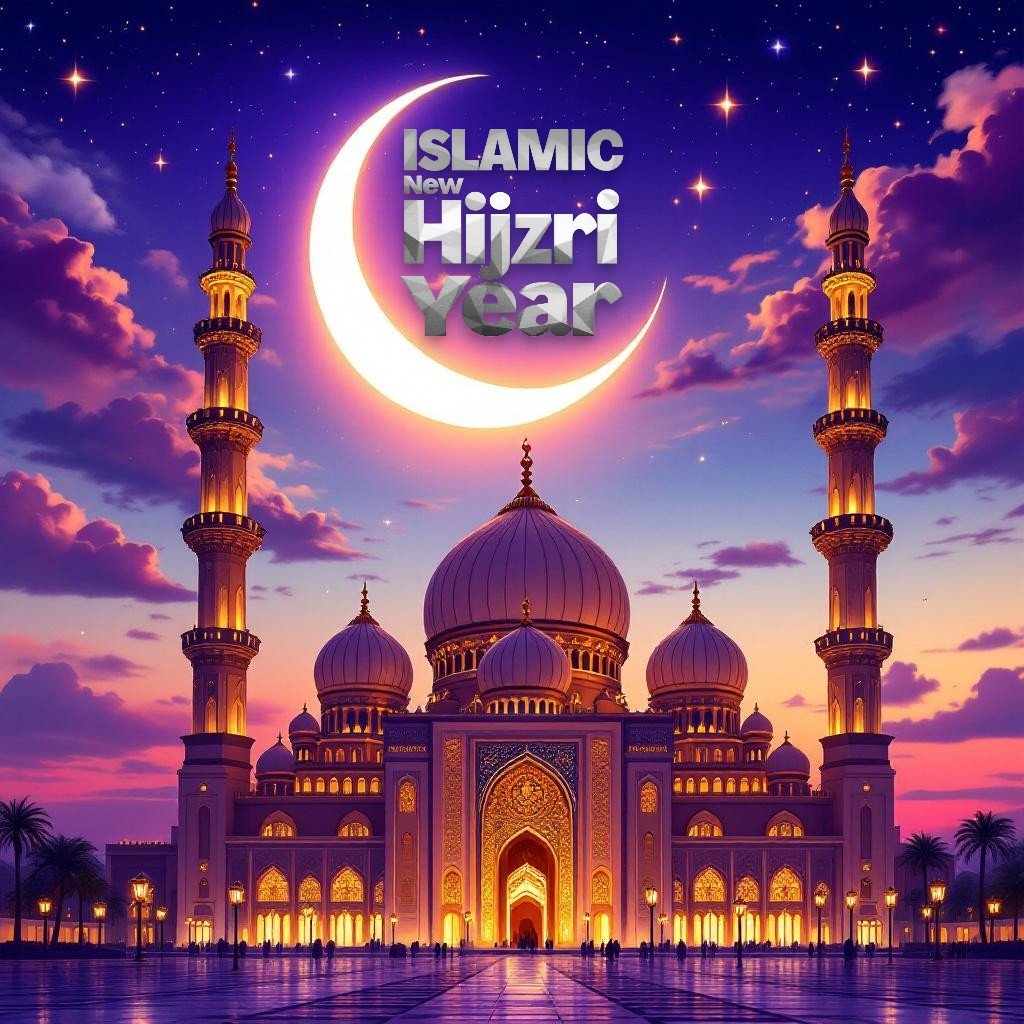Introduction
Table of Contents
ToggleThe Islamic New Hijri Year is the beginning of a spiritual journey for Muslims worldwide. The first
month of the Islamic lunar calendar, Muharram is much more than a unit of time; it is a unusual sacred time of reflection, remembrance, and awakening. This time represents a special journey for the believer who engages in such a journey according to the Qur’an and the Sunnah of the Prophet ﷺ, during Muharram, the believer is encouraged to reflect on their previous deeds and then turn toward Allah ﷻ and sincerely repent.
“Indeed, the number of months with Allah is twelve [lunar] months in the register of Allah… of these, four are sacred.”
(Surah At-Tawbah, 9:36)
Muharram is one of those sacred months and for the individual seeking spiritual enlightenment, Muharram presents Momentous potential of manifold blessings and lessons that are from Allah.
Also read: Embrace Peace Through Faith
Related: Signs of Qiyamah
📝 Summary
In Islam, the Islamic New Hijri Year and the sacred month of Muharram represent a spiritually significant time. Muharram is one of the four sacred months prescribed by Allah ﷻ, and opens the door for reflection, rejuvenation, and sincere intentions. Muharram is rooted in the lessons of the Hijrah (migration) by the Prophet Muhammad ﷺ and calls believers to begin the year with sincerity, patience, and weary devotion.
The Day of Ashura, its virtues, and fasting traditions, are extensively explored within authentic hadith. In addition to authentic hadith, the blog will illuminate inspiring Sunni Sufi spiritual insights, simple practical things to do during the month, and why Muharram and Hijri values are relevant in our lives today. It will utilize historical context, Qur’anic references, and heart-warming narratives to connect with both Muslims and non-Muslims, about the spirited beauty and spiritual depth of Muharram and the Islamic New Year.
Key Features of the Islamic New Hijri Year & Muharram
1️⃣ A Month of Absolute Sanctity as Chosen by Allah
Muharram is one of the four sacred months during which fighting is prohibited and good deeds are multiplied.
“The best fasting after Ramadan is fasting in the month of Allah, Muharram.”
Sahih Muslim
2️⃣ The Islamic New Hijri Year (Hijrah) – A New Start
The Islamic New Hijri Years tarts with the Hijrah, the migration of the Prophet Muhammad ﷺ from Makkah to Madinah. The Hijrah was both a physical journey as well as a spiritual revolution where an Islamic society was formed.
3️⃣ Day of Ashura (10th Muharram)
This is one of the blessed days in Islam. Fasting on this day is a Sunnah:
“By fasting on the Day of Ashura, the previous years’ sins will be forgiven.”
Sahih Muslim
4️⃣ Stories of the Prophets on Ashura
It is reported through authentic narrations that the event of Prophet Musa (Moses) and the Israelites being saved from Pharaoh occurred on that day. For this reason, the Prophet Muhammad ﷺ observed fasting and encouraged others to fast on Ashura, to highlight the unity of divine guidance between the prophets.
5️⃣ Islamic New Hijri Year is a Time of Peace, Not Celebration 
Like other cultures, some culturally consider The Islamic New Hijri Year a time of fireworks, parties, and celebration. In Islam, however, it is a month of mourning and should be honored for the solemnness of the month with reflection, charity, and prayer.
6️⃣ Remembering Abandoned Sunnahs
Muharram provides an excellent opportunity to remember abandoned Sunnahs or Practices, such as fasts, sadaqa, and a relationship with the Qur’an.
7️⃣ A Spiritual Reset for the Year Ahead
Muharram is a little like a spiritual “New Year’s resolution.” It allows us to think about the past, make new commitments to our self-improvement, and strive to be in a constant state of taqwa (God-consciousness).
8️⃣ Accounts of Righteous Companions
Many of the Sahabah (companions of the Prophet PBUH) would fast often in Muharram and began the year with extra prayers offered. Many embodied their devotion to Allah ٠٠٠ by using the sacred time of Muharram appropriately.
9️⃣ Deepening Greater Love for the Ahl-e-Bayt
The Sunni Muslims also honor Muharram as a way to recognize the noble sacrifices of the Ahl-e-Bayt, the family of the Prophet PBUH), particularly Imam Hussain (RA), as the ultimate/ultimate symbol of giving up so much to stand for truth and justice.
📖 Religious Significance & Core Beliefs
The Islamic New Hijri Year serves as a reminder that time is a trust from Allah. Each passing year represents a closed chapter in our book of life. Muharram encourages:
Self-reflection
Sincere repentance (Tawbah)
Increase in remembrance (Dhikr)
Justice and patience
Spiritual Stories:
Story of Hazrat Abdul Qadir Jilani (RA)
Respected Abdul Qadir Jilani (RA) would spend the first ten days of Muharram fasting and praying through qiyam (night prayer). He insisted that the heart must also fast from sin the way the body is fasting from food. One of his most well–known sayings: “O seeker, you should start your year with dhikr remembrance, and not with ghaflah heedlessness. Do not enter the sacred (meaning the Islamic New Year) while being far away from the Sacred.”
Khwaja Moinuddin Chishti (رحمة الله عليه)
During Muharram, Khwaja Moinuddin Chishti once spent the first ten nights of Muharram completely alone and in isolation, devoting himself whole to remembrance of Allah. When asked why, he replied: “Your year begins with your soul‘s resonance, I want mine begin with silence, sincerity and divine connection.“ This story teaches us that Muharram is not a time of worldly celebration – but of inward purification.
Story of Khwaja Nizamuddin Auliya (رحمة الله عليه)
In a gathering in Muharram, Khwaja Nizamuddin Auliya was once asked, “what the best act of worship would be in this month?“ He said: “Serve other people (the Muslims) for the sake of Allah, the one who simply would feed a hungry soul in Muharram, their name would have been written with the truthful.” When we think about his words, they remind us that spiritual renewal is also about compassion.
Khwaja Bandanawaz (RA)’s Experience and Muharram Reflection
One time during the holy month of Muharram, Khwaja Bandanawaz (RA) stepped away from his public talks and dedicated the first ten days to intense devotion and fasting. His disciples were worried over his complete absorption and distancing from worldly matters and gatherings.
One of his khulafa (spiritual deputies) respectfully inquired,
“Huzur, is everything alright? People await your benefit but we see you in silence this Muharram.”
Khwaja Bandanawaz (RA) took a moment and wept, “this is the month where we commemorate the ultimate sacrifice of the Ahlul Bayt (Family of the Prophet ﷺ), particularly Sayyiduna Imam Hussain (RA). What can be the value of my words in a month designated for contemplation and purification? It is time to wash our souls of tears, and to return wholeheartedly to Allah ﷻ.”
He went on to say,
“While our new year of Hijrah, should remind us of two things: the Prophet ﷺ’s migration for truth, and Imam Husayn’s martyrdom for truth. Both examples illustrate the choice of sacrifice over comfort. If we are sincere in our claims of being their lovers, then it is upon us to migrate from sin and ego toward sincerity and servanthood.”
📚 Important Facts About the Islamic New Year & Muharram
✅ Muharram is the second holiest month after Ramadan
✅ Fasting on the 9 and 10 or 10 and 11th of Muharram is Sunnah
✅ Muharram is not a month of celebration or fireworks in Islam
✅ The Hijrah – is not a history lesson, it is a lesson of patience, sacrifice, and faith.
Conclusion:
The Islamic New Hijri Year year and the month of Muharram are times to start anew again s, spiritually, morally, and emotionally. Let us start this new year with a clean heart, pure intentions, and love for the Sunnah of the beloved Prophet ﷺ.
The Islamic New Hijri Year is more than just a change of date – it is a spiritual checkpoint for every believer to reflect on their faith, intentions, and objectives. The start of the Islamic New Hijri Year gives Muslims a monumental moment to renew their relationship with Allah ﷻ, forgive, and make sincere wishes, based on the Qur’an and Sunnah, for the future. It is a time to move past past mistakes and to start fresh and commit ourselves toward worthy goals with a clean heart.
The Islamic New Hijri Year also serves as a poignant reminder of the significant Hijrah (migration) of Prophet Muhammad ﷺ—a life transition with historical significance for Muslims. We can draw lasting lessons from the migration of the Prophet ﷺ during this Islamic New Hijri Year, as believers should consider migration from sin to sincerity, negligence to being mindful, and reliance on made up things in this worldly existence to reliance on Allah ﷻ. It is also important for the believer in this moment to experience an inner awakening of the heart in the pursuit of closeness to Allah ﷻ.
and reliance on made up things in this worldly existence to reliance on Allah ﷻ. It is also important for the believer in this moment to experience an inner awakening of the heart in the pursuit of closeness to Allah ﷻ.
“And whoever relies upon Allah – then He is sufficient for him.”
Surah At-Talaq, 65:3
Let this Islamic New Hijri Year & Muharram be your new spiritual chapter. Let’s move forward with intention, prayer, and hope.





Mashallah you explained it very well. Salamat rahe…
JazakAllah Khair